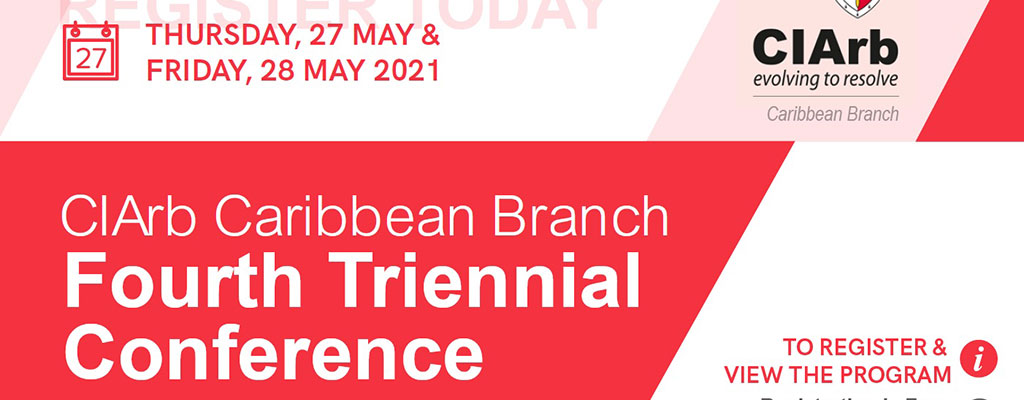Fourth Triennial Conference (Online): IMPROVING THE ADR LANDSCAPE IN THE CARIBBEAN
The Caribbean Branch of the Chartered Institute of Arbitrators (CIArb) held its Fourth Triennial Conference on “Improving the ADR Landscape in the Caribbean” on May 27 and 28, 2021. The event, which took the form of a webinar, was run in partnership with the United Nations Commission on International Trade Law (UNCITRAL).
As well as being a research centre, CIArb is the world reference organisation for training mediators and arbitrators. The Caribbean Branch seeks (i) to train new practitioners in how to use alternative dispute resolution methods; and (ii) to help all the actors in the area become more familiar with mediation and arbitration.
In more specific terms, the event examined the role played by international instruments in the field of arbitration (the UNCITRAL Model Law and the New York Convention) and mediation (the Singapore Convention) in developing the use of ADR in the Caribbean region.
Numerous eminent figures from the region shared their expertise and perspectives on a variety of subjects, such as “The United Nations Commission on International Trade Law (UNCITRAL) - its past and future achievements and influences on international arbitration” and “Dispute resolution in the Caribbean: Current trends and future trajectories” (see the full programme attached).
The issues at the heart of the future development of the discipline were addressed directly: weight was given to the problem of the unequal representation of different cultures and nationalities in the field of mediation and - more particularly - arbitration, together with the need to continue training in this area.
The OHADAC project team welcomes the fact that mention was made of the plans to create the CARO Centre by Sir Dennis Byron, Patron and Honorary Fellow of the Caribbean Branch of the CIArb and former President of the Caribbean Court of Justice.
In addition, Marie-Camille Pitton, a lawyer at the Paris and New York Bars and a consultant for ACP Legal on the OHADAC project, chaired the panel on “The UNCITRAL Model Law as a basis for harmonising and improving national laws”.
The speakers on the panel were:
- Jae Sung Lee: Legal expert at the UNCITRAL Secretariat.
- Barry Leon, FCIArb: Arbitrator (Arbitration Place & 33 Bedford Row) and certified mediator, former Presiding Judge of the Commercial Division of the Eastern Caribbean Supreme Court in the British Virgin Islands.
- Christopher Malcolm, FCIArb: Lawyer, arbitrator and mediator; Consultant Legal Advisor to the Jamaica Ministry of Justice; Secretary-General of the Jamaica International Arbitration Centre (JAIAC); senior lecturer, Faculty of Law, Mona Campus, University of the West Indies, Jamaica; and former Attorney-General in the British Virgin Islands.
In their respective presentations - and during the ensuing discussions - the panellists stressed the importance of adopting the model law in the different countries in the Caribbean, especially the English-speaking countries. Indeed, many of these countries are still governed by national arbitration laws modelled on the old versions of the English Arbitration Act. Against this background, it appears that the model law means it is possible both to adopt a legal framework of reference that is at the forefront of best practices in the field but also to benefit from the provisions of a uniform law, adopted by a growing number of countries worldwide, thereby affording greater transparency.
Moreover, the various speakers stressed the fact that the support offered by UNCITRAL is backed up by training to ensure an effective transition between the old and new provisions that apply in this matter. Furthermore, significant expertise is developing regionally in the different countries of the Caribbean that have adopted the UNCITRAL model law and have helped promote it. On this particular subject, as on many others, cooperation between the various territories in the region is once again encouraged.
Jae Sung Lee first gave an overview of the work carried out by the UNCITRAL Secretariat to promote the model laws worldwide and in the Caribbean region. He also went over the role and legal support provided by the United Nations Commission for reviewing and helping to draft local legislation on arbitration as well as training.
Barry Leon described and analysed the process of adopting the model law in the Cayman Islands, British Virgin Islands and the Bahamas, highlighting the importance of the practical training of judges, which took place in the Bahamas when the model law was adopted. This training work was carried out with the Branches of the Chartered Institute of Arbitrators, which were present throughout the process. Some “adaptations” or “deviations” from the original text have also been made to reflect local peculiarities. Barry Leon rightly pointed out the importance of making these adaptations transparently and even “harmonising” them at regional level.
Christopher Malcolm succeeded in putting the practical use of the UNCITRAL model law in Jamaica into perspective. He mentioned and presented the approach of adopting the UNCITRAL model law for international arbitration and the most recent version of the English Arbitration Act for internal arbitration, while underlining the potential and usefulness of the UNCITRAL model law also in this area as was ultimately adopted in Jamaica.
In conclusion, it was stressed that the adoption of the model law would not happen overnight: it forms part of an ongoing process, with training programmes and opportunities for local Bars that need to be fully embedded in the process. Significant regional expertise already exists in this area, and countries wishing to embark on the process are encouraged to cooperate, exchange best practices and help each other to ensure that the adoption process is effective. Finally, the key role of the Caribbean Branch of the CIArb, which naturally aims to coordinate this expertise, should be emphasised.
Published on 2021-06-25, 6:51 am
















